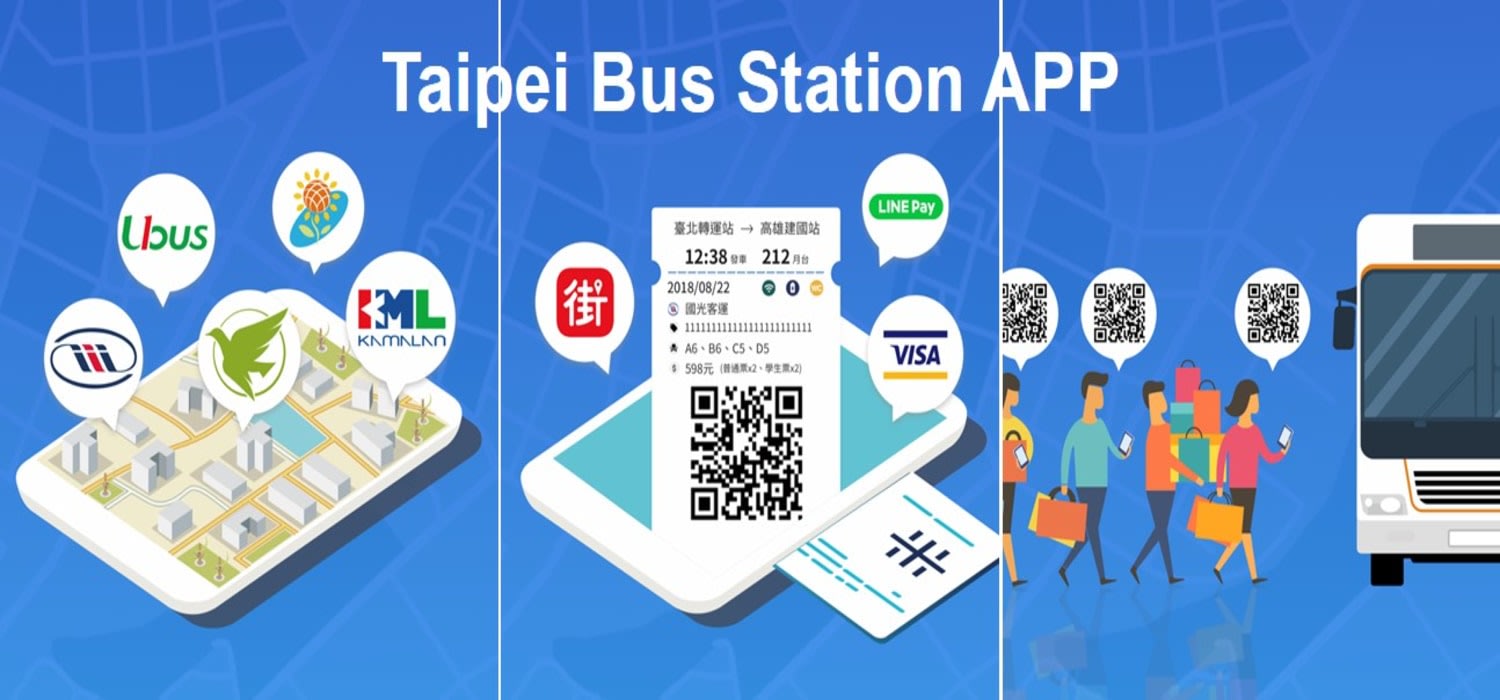
Complicated ticketing process was the most time-consuming
According to the report of Directorate General of Highways of MOTC, Taipei Bus Station accommodates 970,000 buses every year, and transports more than 29 million passengers. There are 10 bus operators with more than 20 manual ticket counters. As the ticketing system of each bus operator is run separately, there is no integrated platform for passengers to purchase tickets online. On consecutive holidays or festivals, people often spend a lot of time lining up in order to purchase tickets and even getting on buses as the entire process, from ticketing to checking, is done manually. Without the real-time ticketing status, bus operators are unable to keep buses on schedule, which increases their operating costs.
Taipei Bus Station (TBS) APP is developed through public-private-people partnership (PPP) to provide one-stop bus service
To promote industrial upgrading and transformation and the development of digital technologies, the Taiwan government is implementing the "Smart City Taiwan Project" through the Industrial Development Bureau of the Ministry of Economic Affairs (MOEA). Focusing on six major aspects (i.e., transportation, healthcare, governance/security, tourism/retail, agriculture, and education), the project provides subsidies for businesses to develop innovative applications. As of today, the project has pulled in 719 businesses to develop more than 223 smart applications, benefiting 8.54 million people.
The Industrial Development Bureau assisted Wan Da Tong Enterprise Co., Ltd. in integrating ticketing platforms to speed up the bus service process. As of today, Taipei Bus Station APP horizontally integrates the ticketing of 11 highway bus companies, and continues to negotiate with different companies such as Taiwan Tourist Shuttle and shipping. For non-systemic companies, TBS also provides a franchisee system with complete functions including "search, book, pay, take, check, refund, divide, exchange". With a smartphone in hand, people can enjoy one-stop service via APP from checking available seats, purchasing tickets any time, and receiving reward points online to boarding with tickets presented. TBS also enables bus operators to keep real-time track of the ticketing status, thus keeping buses on schedule. As to vertical integration, TBS supports three mobile payment methods for saving ticket paper and human resources. Passengers can exchange tickets with the same bus operators 30 minutes before boarding. In remote areas where the network connection can be unstable, passengers are allowed to present their tickets offline.
Overall, TBS developed by Wan Da Tong, as well as 158 ticket-checking devices, has been successfully introduced to bus stations in 17 cities or counties across Taiwan. It has 180,000 registered members and about 50,000 active users. The number of ticket purchases averages 1,000 per day. Through TBS, not only can reduce the costumer pressure from the counter, improve service quality, but also be an opportunity to promote industrial upgrading, which is an important milestone in transportation informatization. As an extension to the project, Wan Da Tong has also assisted the Maritime Port Bureau of the Ministry of Transportation and Communications (MTOC) in integrating ticketing platforms to offer one-top mobility service. To realize the Mobility as a Service (MaaS) concept, TBS also provides accommodation and travelling in the most cost-effective way, which is expected to effectively boost the economic activities of surrounding industries.
Author:
Yi-Hsuan Yeh, ISTI,
Taiwan Smart City Development Project Office of Industrial Development Bureau, M.O.E.A.